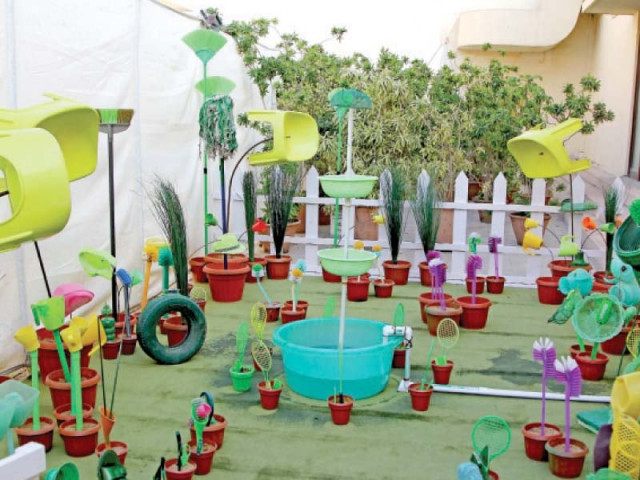Complexities of memory and fiction
According to Naqvi, “recollection is always a communal endeavour.”

An art installation shows a garden made of plastic utensils, toilet brushes and discarded shoes.
How do we remember a past that has been colonised? How is personal memory subsumed by national narratives and how is a sense of amnesia, trauma and rupture portrayed then?
In an attempt to answer these questions posed by moderator Framji Minwalla at the session titled, ‘Fiction, Memory and Colonialism,’ author HM Naqvi, German author Christoph Peters, documentary filmmaker and writer Sadia Shepard and novelist Kamila Shamsie took the audience on a personal journey.
According to Naqvi, “recollection is always a communal endeavour.” By recalling an anecdote about monkeys and mittens from his life in Algiers, he traced how his father’s recollection of the same episode shaped that particular memory for him. “Fiction is a lie that tells the truth,” he said. Since there is an inherent vacuum in our socio-cultural history, he can only employ reality in his service of fiction and vice versa. Concurring with Naqvi, Peters stated fiction is indeed a way to recreate the past. However, he added the ability to reconstruct blurs the line between memory and narration. “My personal state always affects my moods and images of my memories, and when I write from my experiences, I realise I have so many realities — some true, some misremembered and some de-remembered,” he added.
Shepard immediately lulled the audience into silence by sharing her own past — a family with a plethora of religions, identities and nations in a single generation. Being told about her grandmother’s Jewish ancestry at the age of 13 when she stumbled upon the former’s old school pin, Shepard stated how important it was to be rooted in a sense of history. “This is an important part of what shapes truths and written word - there is tremendous fiction in memoir as well,” she said.
Shamsie said when she visited Delhi — a place where her grandparents had lived, there was no sentimental burst of nostalgia, however when she visited again in the midst of writing a novel, she cried at the sight of the city. “Delhi was where my characters had met and that fact was enough to evoke a strong emotion in me.” Shamsie then concluded the session with a powerful explanation, “Empathy with historical moments is important and will be shaped by what separates history we know from the outside compared to the one that prevails inside us.”
Published in The Express Tribune, February 6th, 2016.



















COMMENTS
Comments are moderated and generally will be posted if they are on-topic and not abusive.
For more information, please see our Comments FAQ